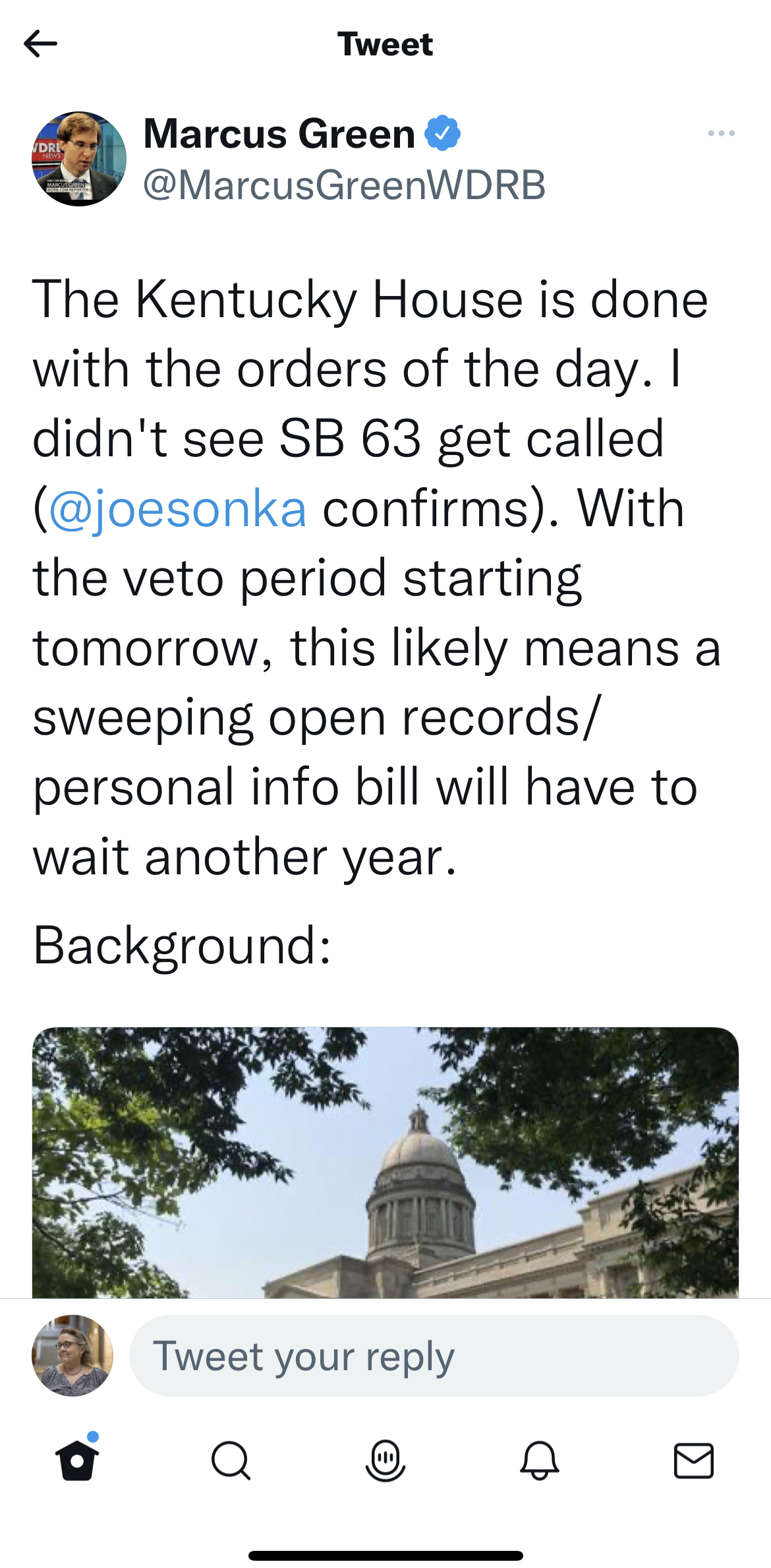
The good news at the close of Day 58 of the 2022 General Assembly — for followers of Kentucky’s open government laws — is no news.
The House of Representatives failed to call Senate Bill 63, substantially amending the open records law. It is effectively dead in the current session.
For the third time since 2019, Senator Danny Carroll sponsored the bill aimed at protecting “personally identifiable information” of “public officers” by clumsily forcing the square peg that is SB 63 into the round hole that is the current open records — already struggling under the weight of destructive changes made in recent legislative sessions.
If enacted, SB 63 would have immediately amended the open records law to exempt personally identifiable information, as defined in the bill, of a public officer and/or their immediate family, as defined in the bill, if that public officer/family member notified the public agency in whose custody the records resided that they did not want the information made public. This included redaction and removal of the information from any public posting or publication existing at the time of the request.
The bill also created a new cause of action that permitted public officers/immediate family members to file a civil action against a person who disseminated personally identifiable information in response to a decision or action — or to influence or impact any future action — taken by the public officer as part of his or her official duties if the person did so with the intent to intimidate, harass, threaten, or alarm and the dissemination placed the public officer/immediate family member in reasonable fear of physical injury or reasonable fear of property harm. If successful, the public officer/immediate family member could have recovered damages — including punitive damages, court costs, and reasonable attorney’s fees.
In its statement of opposition to SB 63, the Kentucky Press Association described it as “an affront to the Constitution and principles of open government,” declaring that it will “dramatically alter the way the Open Records Act currently works” and that “no legislator can support this bill and call themselves a champion of government transparency.”
The bill passed out of the Senate by a vote of 24 to 8 in late February, and advanced from the House Judiciary Committee on March 24. It was posted for passage in the House Orders of the Day both yesterday and today but was never called.
No news is good news, indeed!
The uncertainty of how and when SB 63’s adverse consequences would have struck — and what, precisely, those consequences might have been — made it, to some extent, a greater threat than 2021’s HB 312.
We did not need a chrystal ball to predict how the new residency requirement for users of Kentucky’s open records laws would obstruct “nonresident” access to public records. We did not have to consult Tarot cards to recognize the dangers of a wholly unaccountable legislature excepted not only from the open records law but from judicial review of its denials of legislative records requests.
But given the threat of civil liability for prohibited dissemination of public information under SB 63, it’s a safe bet that records requesters would have been “chilled” in their use of the law and records obtained thereunder, records custodians would have struggled to discharge their duties, public agencies responsible for implementation would have walled off large swaths of public information — all to avoid prohibited dissemination — and public officers would have been no “safer” after its enactment than before its enactment.
Our once serviceable open records law would have been diluted at best — polluted at worst — by a statutory scheme that yielded no positive results.
At the end of Day 58, we are left to speculate on the inaction of the House of Representatives. Since the voices of media experts and open government advocates were ignored in the past, the House’s inaction may be attributable to organized opposition from public officials, including county clerks and property valuation administrators, charged with the impossible task of implementation of the proposed law. Or it may simply reflect deprioritization of the bill in favor of higher priority bills (though matters were largely concluded in the House nearly two hours before the midnight deadline).
Let’s celebrate as we speculate. This is a welcomed end to an otherwise grim session for proponents of open government (and for many others as well).


